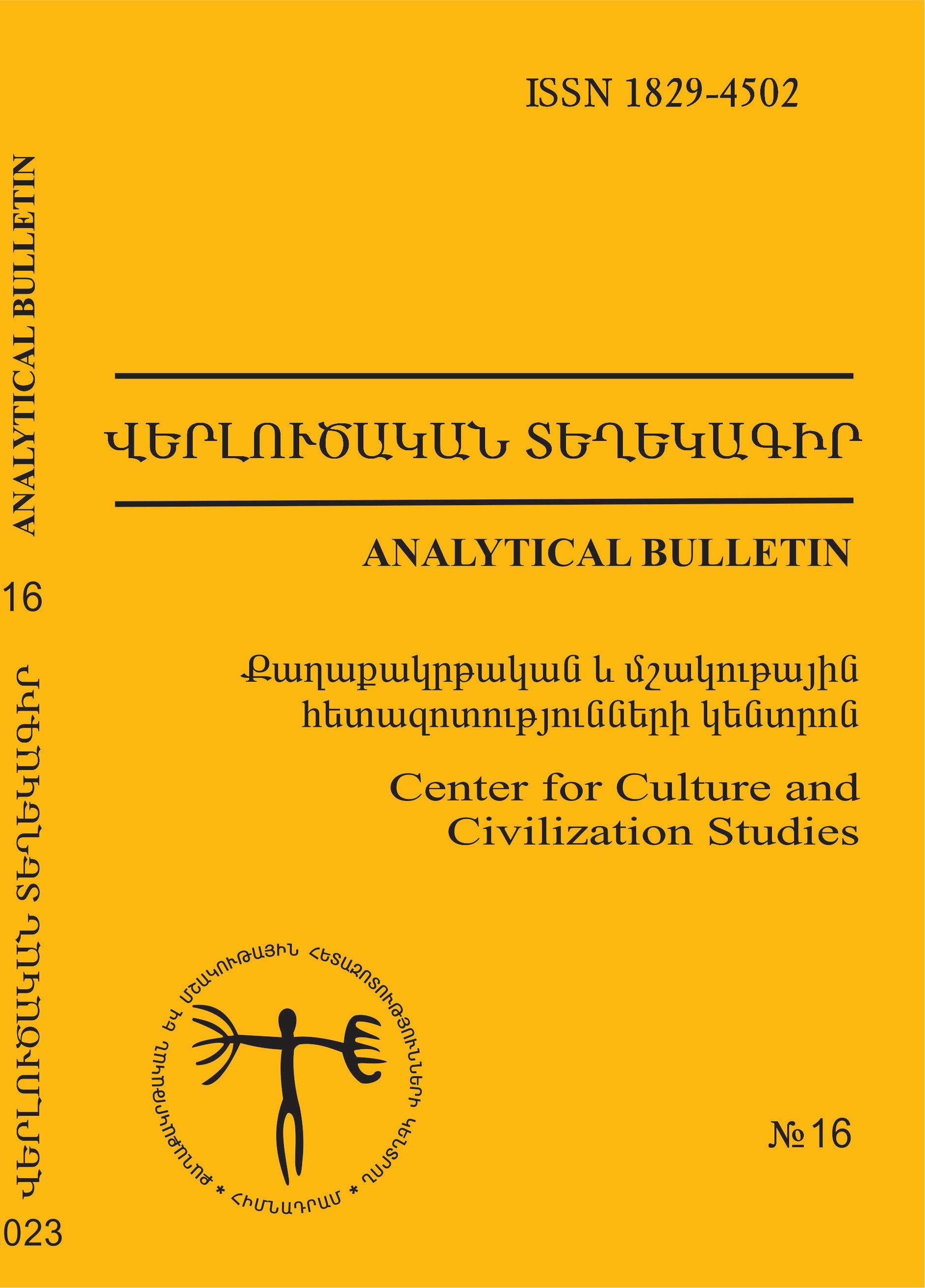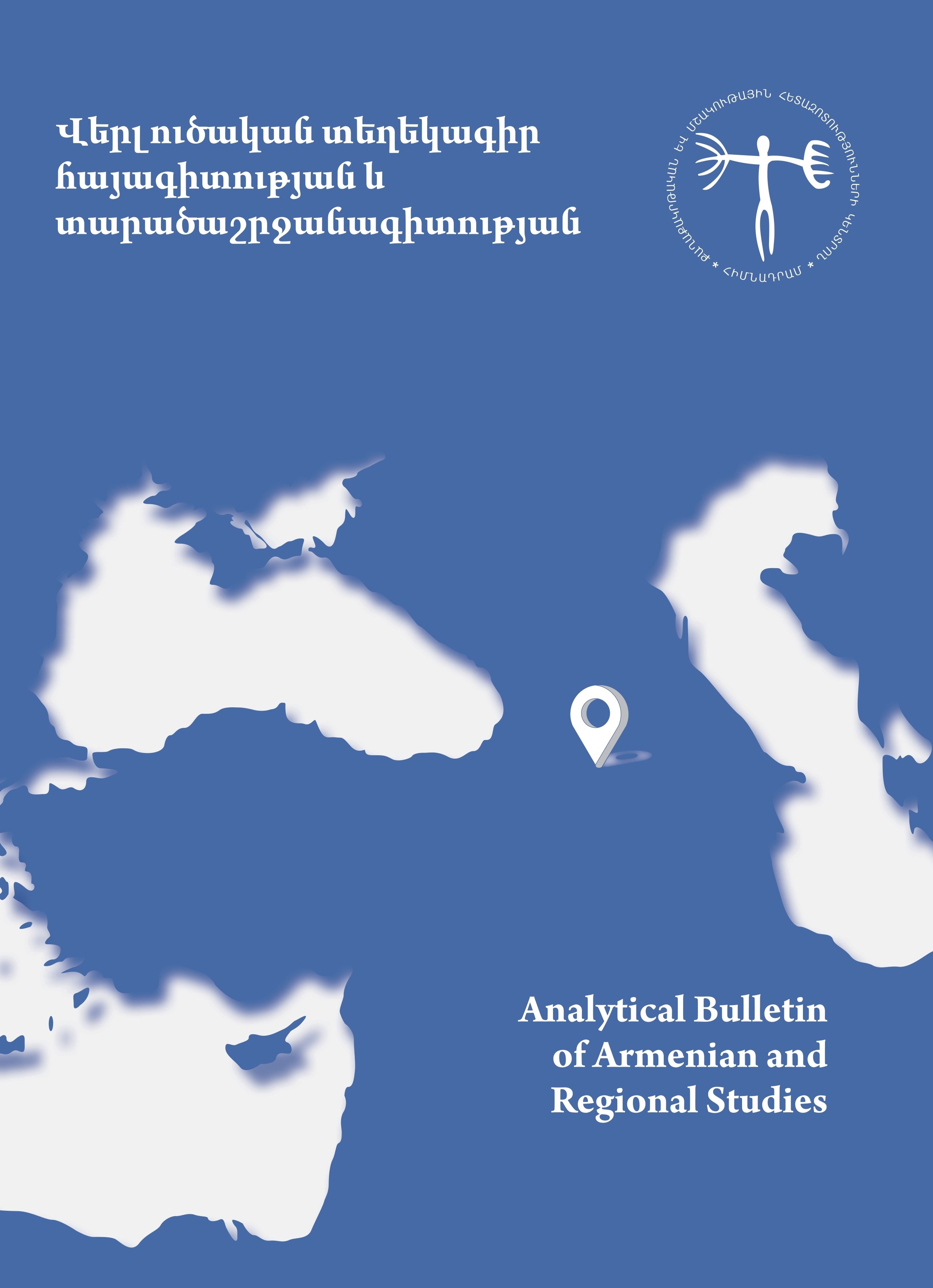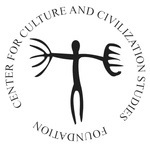Civic and Political Participation of Armenian Youth in The Post-War Reality: Perceptions and Practices
DOI:
https://doi.org/10.56673/18294502-23.16-79Keywords:
RA youth, youth participation, nformation technology and participation, civic education, youth studiesAbstract
The primary objective of this article is to conduct an in-depth analysis and presentation of the current understanding of the engagement of young individuals in civic and political processes. It seeks to elucidate the principal forms of youth participation and the main problems and challenges that influence their engagement. Furthermore, the article endeavors to shed light on the predominant issues and challenges encountered in the realm of youth political participation, with a specific focus on Armenian youth. In the contemporary context, comprehending how the domains of youth studies, policy formulation, and practical implementations address the intricate matter of youth participation has gained heightened significance. The article presents the issues of youth participation practices and elucidates the interaction between education, information technology, and civil society.
The findings of the research underscore a prevailing trend of non-traditional participation methods taking precedence in Armenia today. Among Armenian youth, there exists a lack of trust in governmental institutions, official information channels, and even in the prospects of the future at large. This prevailing sentiment significantly impacts their civic and political participation endeavors. What becomes apparent is the pressing need for platforms that facilitate youth participation and the dissemination of knowledge. Engaging at the local or community level provides young individuals with a unique opportunity to witness immediate and tangible outcomes of their involvement. This not only establishes a positive precedent for their participation on broader scales, whether at the national or international level, but also cultivates a sense of empowerment and efficacy. In the context of the Republic of Armenia, motivation emerges as a pivotal driving force shaping the participation practices of its youth. While teenagers perceive participation as a means to accrue knowledge and social capital, their slightly older counterparts place significant emphasis on using participation as a conduit to influence decision-making processes and navigate the far-reaching aftermath of the 2020 Nagorno-Karabakh conflict.
The place of residence influences participation practices, with a more adverse impact observed among rural youth aged 18-35. Conversely, for those aged 15-19, the connection between place of residence and participation appears less pronounced. The youth participation dynamics in the Republic of Armenia are intertwined with access to information technology, the quality of civic education, and public trust levels. These factors exhibit substantial interconnections that shape the participation landscape. A critical determinant is the crisis of confidence, which directly affects youth participation. However, it's worth noting that this crisis can be effectively overcome through comprehensive civic education initiatives.
References
“Deepening democracy in a fragmented world”. World Development Report, UNDP, http://hdr.undp.org/en/reports/global/hdr2002/, 2002
“Revisiting youth political participation. Challenges for research and democratic practice in Europe’’, ed. by Joerg Forbrig, 19, Council of Europe Publishing, 2005
Analytical paper on “Youth Participation, Young people political participation in Europe: What do we mean by participation?”,
Atanesyan, Arthur and Mkrtichyan, Arthur, “Youth Perceptions of the War in Ukraine and its Possible Consequences (On the Case of Armenian Youth in Yerevan)”. Journal of Sociology: Bulletin of Yerevan University, 14, (2023): 37, 7–28
Ballard, Parissa, What Motivates Youth Civic Involvement? Journal of Adolescent Research, 2014, 29(4): 439–463.
Contribution of Non-Programme Countries To The Eu Youth Wiki Chapter V: Armenia Participation, Youth Partnership, https://pjp-eu.coe.int/documents/42128013/58896112/Armenia-Youth-Wiki-Chapter-5.pdf/356ca22b-b3fe-aff1-360f-a3ee87d8779b?t=1680622827464
Crowley, Ann and Moxon, Dan, New and innovative forms of youth participation in decision-making processes, https://rm.coe.int/new-and-innovative-forms-of-youth-participation-in-decision-making-pro/1680759e6a, 2017․
Deželan, Tomaž, Young People and Democratic Life in Europe: What Next After the 2014 European Elections?, (European Youth Forum, 2015), www. youthup.eu/app/uploads/2015/11/YFJ_YoungPeopleAndDemocraticLifeInEurope_B1_web-9e4bd8be22.pdf
Farthing, Rys, Why Youth Participation? Some Justifications and Critiques of Youth Participation Using New Labour’s Youth Policies as a Case Study, (YOUTH & POLICY, 2012)
Foucault, Michel, The Archaeology of Knowledge and the Discourse on Language, New York: Pantheon Books, 1972
Furlong, Andy, Handbook of Youth and Young Adulthood: New perspectives and Agendas. London: Routledge, 2009․
Hart, Roger, Children’s participation, from tokenism to citinzenship, UNICEF International Child Development Centre Spedale degli lnnocenti, Florence, Italy, 1992. https://www.unicef-irc.org/publications/pdf/childrens_participation.pdf
Harvard research suggests that an entire global generation has lost faith in democracy. Quartz. by Gwynn Guilford Published November 30, 2016, https://qz.com/848031/harvard-research-suggests-that-an-entire-global-generation-has-lost-faith-in-democracy/,
https://doi.org/10.18356/a4137e60-en.
Huntington, Samuel P., by Handayani M., On political participation and democracy, Department of Political Science Kulliyyah of Islamic Revealed Knowledge and Human Science International University Malaysia, Semester 3, 2008-2009.
Keer, David, Re-examining Citizenship Education in England. In Torney-Purta, J., Schwille, J. and Amadeo, J. Civic Education across countries: Twenty-four national case studies from the IEA Civic Education project, Amsterdam, IEA., 1999.
Luhmann, Niklas,The reality of Mass media, First published January 1, 1996.
Nam, Taewoo, Dual effects of the internet on political activism: Reinforcing and mobilizing, Government Information Quarterly. (2012). № 29, 90–97
Niemi, Richard and Junn, Jane, Civic education: What makes students learn? New Haven & London, CT: Yale University Press, 1998.
Siurala, Lasse, Changing forms of youth participation. New forms of youth participation, Biel: Switzerland, 2000.
Tai, K.-T., Porumbescu, G., & Shon, J. Can e-participation stimulate offline citizen participation: an empirical test with practical implications, (Public Management Review, 2019), 1-19
UN-DESA, World Youth Report 2016: Youth Civic Engagement, (UN, 2016),
Атанесян, Артур, “Влияние социальных сетей на протестное поведение (на примере Армении)”, Социологические исследования, Номер 3, (2018): 73-84, http://ras.jes.su/socis/s013216250004280-1-1
Галстян, Марина “The participation schemes in armenian educational system”, Вестник Российско-Армянского (Славянского) университета: гуманитарные и общественные науки. – (Ереван, 2020). – №. 1։ 127-144.
Самюэль Хантингтон., Третья волна: Демократизация в конце XX века, (РОССПЭН, М., 2003)
Сорокин, Питирим, Главные тенденции нашего времени, Москва., 1997, 199.
Կանանց ընտրական վարքի առանձնահատկությունները 2021թ.-ի ազգային ժողովի և ՏԻՄ ընտրություններում, https://oxygen.org.am/wp-content/uploads/2022/05/REPORT_Women-Electoral-Behaviour_2022_ARM.pdf
Մարգարյան, Հռիփսիմե, «Հայաստանի երիտասարդության կառույցների դասակարգումը և քաղաքական մասնակցության հիմնախնդիրները», Вестник Российско-Армянского (Славянского) университета: гуманитарные и общественные науки, №. 1, (2016): 76-85.
Մարդկային զարգացման ազգային զեկույց, 2018/2019, Ապագա ունենալու իրավունքը․ Հայաստանը վերափոխող երիտասարդությունը, ՄԱԿ-ի զարգացման ծրագիր, Հայաստան, 2019 https://www.undp.org/sites/g/files/zskgke326/files/migration/am/NHDR-ARM_sans-foreword.pdf
Սարգսյան, Առնակ, Քաղաքական մասնակցության հիմնախնդիրները ժողովրդավարական համախմբման փուլում, Երևան, ԵՊՀ, 2022
Վիճակագրական տվյալներ. կանանց և տղամարդկանց մասնակցությունը 2018թ. ընտրական գործընթացներին, https://res.elections.am/images/doc/Statistics2018.pdf
Վիճակագրություն. Կանանց և տղամարդկանց մասնակցությունը 2021 թ. հունիսի 20-ին, https://res.elections.am/images/doc/Statistics2021.pdf
Քաղաքացիական հասարակության ներկա վիճակը և փոփոխվող դերը հանրային քաղաքականության գործընթացներում, հետազոտության զեկույց, Կրթական հետազոտությունների և խորհրդատվությունների կենտրոն, Երևան, 2022, https://e-research.am/storage/books/CSO%20Research_Current_Challenges_Margaryan_Hovakimyan_Galstyan_CERC.pdf
Downloads
Published
How to Cite
Issue
Section
License
Copyright (c) 2023 Marina Galstyan

This work is licensed under a Creative Commons Attribution-NonCommercial 4.0 International License.









